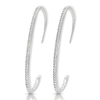Investing in the Future: The Resale Value of Lab-Grown Diamonds
In the evolving landscape of the diamond industry, lab-grown diamonds have emerged as a significant player, offering a more sustainable and ethical alternative to their mined counterparts. As consumers increasingly prioritize eco-friendly and socially responsible choices, lab-grown diamonds have gained popularity not just for their environmental benefits but also for their affordability and beauty. However, a question that often arises among potential buyers and investors is about the resale value of lab-grown diamonds. This blog post delves into the factors that influence the resale value of lab-grown diamonds, comparing them with natural diamonds, and exploring their potential as an investment for the future.
Understanding Lab-Grown Diamonds
Lab-grown diamonds are real diamonds produced in a controlled environment using cutting-edge technology that mimics the natural diamond-growing process. They possess the same chemical, physical, and optical properties as mined diamonds, making them virtually indistinguishable to the naked eye. The primary differences lie in their origin and the impact of their production on the environment and society.
The Resale Value of Lab-Grown Diamonds: Key Factors
The resale value of lab-grown diamonds is influenced by several factors, including market demand, production costs, and public perception. Unlike natural diamonds, which have been marketed for centuries as rare and valuable, lab-grown diamonds are relatively new to the scene. This novelty, combined with the ability to produce more diamonds in a lab setting, can affect their resale value in the current market.
Market Demand and Supply
The demand for lab-grown diamonds has been rising steadily, driven by their affordability, ethical production methods, and environmental benefits. However, because lab-grown diamonds can be produced in a more controlled and potentially limitless manner, their supply is not as constrained as that of natural diamonds. This abundance can lead to lower resale values compared to mined diamonds, whose value is partly derived from their perceived rarity.
Production Costs and Technological Advances
The cost of producing lab-grown diamonds has decreased over time, thanks to technological advancements and more efficient manufacturing processes. This reduction in production costs makes lab-grown diamonds more affordable initially but can also impact their long-term resale value. As production becomes even more cost-effective, the market could see a further decrease in prices, affecting resale values.
Public Perception and Acceptance
Public perception plays a crucial role in determining the resale value of lab-grown diamonds. As awareness and acceptance of lab-grown diamonds increase, so too could their market value. Younger consumers, in particular, who value sustainability and ethical considerations, are more likely to view lab-grown diamonds as a desirable alternative to mined diamonds, potentially boosting their resale value in the future.
Comparing with Natural Diamonds
Natural diamonds have historically held their value over time, largely due to effective marketing, perceived rarity, and the emotional and symbolic value attached to them. However, the resale market for natural diamonds is not without its challenges, with many diamonds losing a significant portion of their retail value immediately after purchase.
Lab-grown diamonds, while often more affordable upfront, face similar challenges in the resale market. The key difference lies in the initial investment—since lab-grown diamonds are priced lower than natural diamonds, the absolute loss on resale may be less, even if the percentage loss is comparable.
The Potential of Lab-Grown Diamonds as an Investment
When considering lab-grown diamonds as an investment, it's essential to think about the term "investment" in a broader sense. While the financial resale value of lab-grown diamonds may currently be uncertain, investing in lab-grown diamonds can be seen as investing in sustainability, ethical production, and the future of the diamond industry.
Ethical and Environmental Considerations
For many consumers, the real value of lab-grown diamonds lies in their ethical and environmental advantages. By choosing lab-grown diamonds, investors support a shift towards more sustainable and humane practices in the jewelry industry, which could lead to increased demand and potentially higher resale values in the future.
A Growing Market
As the market for lab-grown diamonds continues to grow and mature, there may be opportunities for increased resale values. The industry is still in its relatively early stages, and as production methods improve and consumer acceptance increases, lab-grown diamonds could become more entrenched in the market, potentially enhancing their long-term value.
Conclusion
The resale value of lab-grown diamonds is influenced by a complex interplay of market demand, production costs, and public perception. While they may not currently offer the same resale value as natural diamonds, lab-grown diamonds present a unique investment opportunity in terms of sustainability, ethics, and the future of the diamond industry. For those considering lab-grown diamonds, it's important to weigh the financial considerations against the environmental and ethical benefits they offer. As the market for lab-grown diamonds evolves, so too will our understanding of their value—not just in monetary terms, but as a symbol of a more sustainable and ethical approach to luxury.












